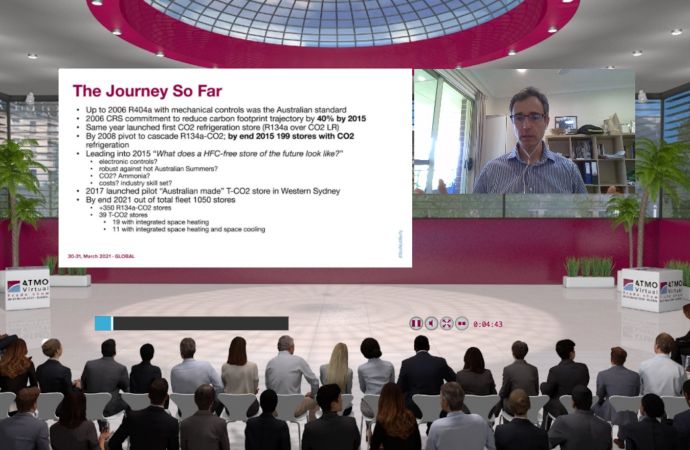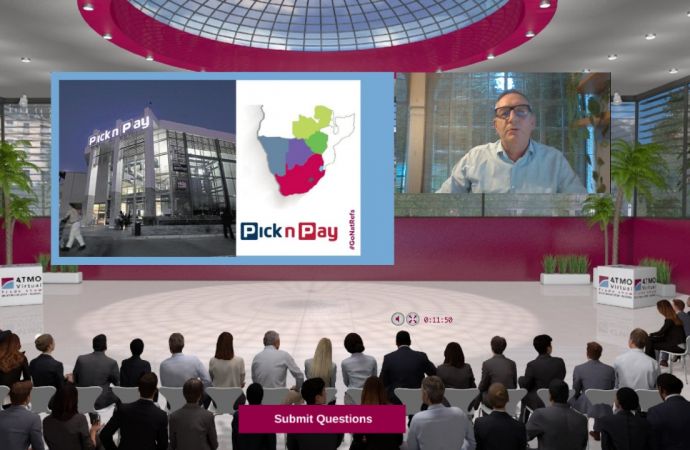The highly efficient U.S-based company employs central ammonia systems as well as low-charge ammonia and transcritical CO2.
_1615294557.jpg)
Pete Lepschat from Lineage Logistics/Thomas Patterson
U.S.-based Lineage Logistics, one of the largest cold-storage operators in the world with more than 330 facilities in 15 countries, is “committed to natural refrigerants.”
“We’re committed to natural refrigerants, including ammonia [R717] and CO2 [R744] as we believe these to be the most environmentally friendly,” said Peter Lepschat, Director of Energy and Special Project at Lineage, based in Novi, Michigan.
Since 2008, Lineage, owned by Bay Grove LLC, has grown through a series of global acquisitions in the U.S., Europe, Australia and Asia. The company’s facilities encompass nearly 2 billion ft3 (56.6 million m3) of storage capacity. Its most recent U.S. acquisition (in July 2020) is Portland, Oregon (U.S.)-based Henningsen Cold Storage, where Lepschat had been Director of Engineering.
Lineage uses a variety of systems types, ranging from standard field-constructed central ammonia systems to modular, low-charge packaged ammonia and transcritical CO2 systems that can reduce or eliminate the hazards associated with systems containing a large amount of ammonia, Lepschat said. (The company still uses HCFC refrigerants, which it hopes to eliminate in a few years.)
“Right now, we are favoring ammonia field-constructed solutions but are open to the alternatives,” Lepschat said. The company, he added, is constantly researching and testing all available natural refrigerant systems, including central CO2 units, for future installations and retrofits.
Lepschat noted that packaged systems “do not require a machinery room, which lowers installation costs.” This allows Lineage to devote more space to product storage, among other benefits. Packaged systems “have also been proven to operate with the same or better efficiency as conventional systems,” he said.
Safety, then efficiency
At Lineage, safety plays a pivotal role in the temperature-controlled logistics company’s requirements for its cooling equipment. Once safety is established, efficiency, as measured by coefficient of performance (COP) comes second; and reliability (based on maintenance levels) is third, Last is flexibility “so we can react to change in customer demands and the energy markets,” said Lepschat.
Lineage’s energy efficiency innovations have, in some facilities, resulted in a reduction in freeze times by more than 50% and improved blast cell energy efficiency by more than 20%, noted Alexander Woolf, Vice President, Research & Development at Lineage. By bringing innovative technologies to the traditional logistics processes, the company has “set a new standard for energy efficiency in the temperature-controlled logistics industry,” which pushes its peers “to reevaluate their energy usage,” he said.
As a result of these innovations, Lineage was recognized, for the second consecutive year, by the U.S. Department of Energy’s Better Plants Program with their 2020 Better Project Award
To improve the efficiency of its facilities, Lineage is focused on the thermal envelope of buildings and making the freezers as airtight as possible. “More that 85% of the load enters a freezer through the doorways, ranging from body heat, air and water vapor infiltration, and machinery, explained Woolf. Therefore, streamlining the movements around the facility is Lineage’s priority.
“Projects like replacing freezer doors are not sexy, but are critical for reducing energy consumption,” Woolf said.
Other methods include increasing the thermal efficiency of cooling systems by reducing compressor and fan power, as well as using sophisticated control systems. “We work to minimize our energy cost per unit by lowering temperature points during the lower-cost periods, and then allowing the system to ‘coast’ during peak grid-load times when power is a lot more costly,” explained Woolf. “Control systems are crucial to this process, and we work with vendors to incorporate our analytics into their solutions.”
Right now, we are favoring ammonia field-constructed solutions but are open to the alternatives,” - Pete Lepschat, Lineage Logistics
Lineage has developed an energy-efficiency algorithm called ‘“flywheeling”’ to drastically reduce facilities’ energy usage and improve sustainable practices. “Flywheeling analyzes historical usage, weather and refrigeration data to calculate and implement the optimal cooling schedule for the building,” said Woolf. “The flywheeling technique uses predictive analytics to quantify how each building interacts with its environment and then optimizes the refrigeration system in real-time.”
Lineage piloted flywheeling at its Mira Loma, California (U.S.) facility in 2018, and is in the process of scaling the technique across its network, said Woolf.
Incorporating an acquired company
Coming to Lineage in its acquisition of Henningsen last year, Lepschat was able to explain how Lineage incorporates acquired companies.
Once Lineage acquires a company, it works with the leadership of that company “to determine which processes and technologies they are using that might be additive – or enhance – our current systems,” said Lepschat. “We understand they have local market knowledge that we could never replicate – that’s why they were acquired in the first place.”
For example, Henningsen has installed unorthodox ammonia refrigeration systems reduce ammonia charge as well as energy consumption compared to conventional designs. The company has also worked with transcritical CO2.
Lepschat explained how a smooth transition is fostered between the two companies: “Lineage has a team of physicists, engineers, mathematicians, data scientists and technologists that work every day to bring cutting-edge technologies to traditional logistics processes and set a new standard for energy efficiency,” he said. “This group works with the operation transition team and the folks at the acquired company to incorporate the myriad of best practices Lineage has learned over the years and help optimize supply chains for speed, efficiency and cost savings.”
In addition, noted Lepschat, Lineage can leverage its size to get an acquired company “better deals on equipment and combine supply chain efforts to serve customers more effectively.”
In day-to-day operation, acquired facilities maintain control over their systems and are empowered to make local decisions. “This includes standard planning, HR and local marketing,” Lepschat said. But top-line design, planning and construction, as well as IT, are coordinated between corporate and local.Related stories


